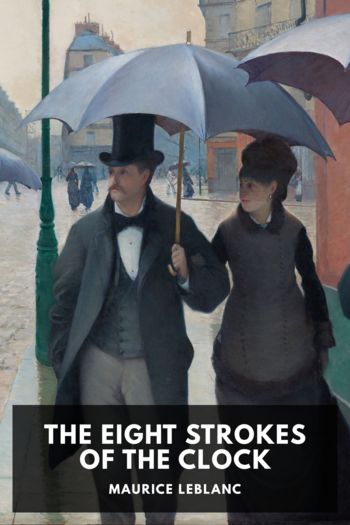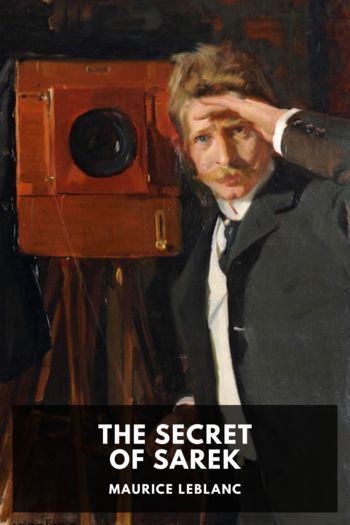The Eight Strokes of the Clock - Maurice Leblanc (reading in the dark .TXT) 📗

- Author: Maurice Leblanc
Book online «The Eight Strokes of the Clock - Maurice Leblanc (reading in the dark .TXT) 📗». Author Maurice Leblanc
She turned her eyes to Rénine as if to ask him if there was no danger in her speaking and revealing the truth.
“Don’t be afraid,” he said. “I will be answerable for everything.”
She drew her hand across her forehead. The horrible scene was being reenacted within her and was torturing her. Germaine Astaing did not move, but stood with folded arms and anxious eyes, while Hortense Daniel sat distractedly awaiting the confession of the crime and the explanation of the unfathomable mystery.
“It was after that and it was through your fault Germaine … I had put back the pocketbook in the drawer where it was hidden; and I said nothing to Jacques this morning … I did not want to tell him what I knew. … It was too horrible. … All the same, I had to act quickly; your letters announced your secret arrival today. … I thought at first of running away, of taking the train. … I had mechanically picked up that dagger, to defend myself. … But when Jacques and I went down to the beach, I was resigned. … Yes, I had accepted death: ‘I will die,’ I thought, ‘and put an end to all this nightmare!’ … Only, for the children’s sake, I was anxious that my death should look like an accident and that Jacques should have no part in it. That was why your plan of a walk on the cliff suited me. … A fall from the top of a cliff seems quite natural … Jacques therefore left me to go to his cabin, from which he was to join you later at the Trois Mathildes. On the way, below the terrace, he dropped the key of the cabin. I went down and began to look for it with him … And it happened then … through your fault … yes, Germaine, through your fault … Jacques’ pocketbook had slipped from his jacket, without his noticing it, and, together with the pocketbook, a photograph which I recognized at once: a photograph, taken this year, of myself and my two children. I picked it up … and I saw. … You know what I saw, Germaine. Instead of my face, the face in the photograph was yours! … You had put in your likeness, Germaine, and blotted me out! It was your face! One of your arms was round my elder daughter’s neck; and the younger was sitting on your knees. … It was you, Germaine, the wife of my husband, the future mother of my children, you, who were going to bring them up … you, you! … Then I lost my head. I had the dagger … Jacques was stooping … I stabbed him. …”
Every word of her confession was strictly true. Those who listened to her felt this profoundly; and nothing could have given Hortense and Rénine a keener impression of tragedy.
She had fallen back into her chair, utterly exhausted. Nevertheless, she went on speaking unintelligible words; and it was only gradually by leaning over her, that they were able to make out:
“I thought that there would be an outcry and that I should be arrested. But no. It happened in such a way and under such conditions that no one had seen anything. Further, Jacques had drawn himself up at the same time as myself; and he actually did not fall. No, he did not fall! I had stabbed him; and he remained standing! I saw him from the terrace, to which I had returned. He had hung his jacket over his shoulders, evidently to hide his wound, and he moved away without staggering … or staggering so little that I alone was able to perceive it. He even spoke to some friends who were playing cards. Then he went to his cabin and disappeared. … In a few moments, I came back indoors. I was persuaded that all of this was only a bad dream … that I had not killed him … or that at the worst the wound was a slight one. Jacques would come out again. I was certain of it. … I watched from my balcony. … If I had thought for a moment that he needed assistance, I should have flown to him. … But truly I didn’t know … I didn’t guess. … People speak of presentiments: there are no such things. I was perfectly calm, just as one is after a nightmare of which the memory is fading away. … No, I swear to you, I knew nothing … until the moment …”
She interrupted herself, stifled by sobs.
Rénine finished her sentence for her,
“Until the moment when they came and told you, I suppose?”
Thérèse stammered:
“Yes. It was not till then that I was conscious of what I had done … and I felt that I was going mad and that I should cry out to all those people, ‘Why, it was I who did it! Don’t search! Here is the dagger … I am the culprit!’ Yes, I was going to say that, when suddenly I caught sight of my poor Jacques. … They were carrying him along. … His face was very peaceful, very gentle. … And, in his presence, I understood my duty, as he had understood his. … He had kept silent, for the sake of the children. I would be silent too. We were both guilty of the murder of which he was the victim; and we must both do all we could to prevent the crime from recoiling upon them. … He had seen this clearly in his dying agony. He had had the amazing courage to keep his feet, to answer the people who spoke to him and to lock himself up to die. He had done this, wiping out all his faults with a single action, and in so doing had granted me his forgiveness, because he was not accusing me … and was ordering me to hold my peace … and to defend myself … against everybody … especially against you, Germaine.”
She uttered these last words more firmly. At first wholly overwhelmed by the unconscious act which she had committed in killing her husband, she had recovered her





Comments (0)